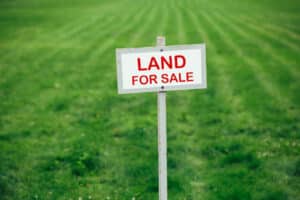In this article I will discuss where some of the cheapest lands in the world are located.
Rather than just focusing on the cheapest prices which are often found in small towns and the countryside in parts of the world where foreigners can’t easily get access to, I will also look at some of the cheapest land prices in developed countries as well.
This article is for informational purposes only, and some of the facts might have changed since the writing of this article, even though I will regularly update it alongside my research team.
My main business is expat financial services, but I do help people with free information such as the ones on this article.
If you want me to invest, don’t hesitate to contact me, email (advice@adamfayed.com) or use the WhatsApp function below.
Table of Contents
Introduction
There are many people who are looking for an industry to invest in. Usually this could be the purchase of land for various purposes.
Since we all know that land is a very scarce commodity, especially in large cities, and if you are looking to buy cheap land, our article will help you take a deeper look at the pricing indicators in different cities.
It is noticed that land prices differ not only by country, but also by city.
There are many variables that affect land prices around the world. Because land prices in major cities are astronomically high, many people choose to buy land for agricultural purposes.
Buying land abroad is another matter, and for those who are interested in buying land, but at low rates, our blog can be your guide. We have collected all possible countries with the lowest land prices.
The great thing about buying empty land is that it serves as a blank canvas for whatever you want to do. Free land is empty space full of potential, and if you are looking for land in the mountains, on the beach, or somewhere in between, you can even find some free lands all over the country if you just be informed where to search for.
When looking for land, it is important to understand what makes it cheaper or more expensive than others. Of course, land with clear income potential, such as for farming or logging, is likely to be more expensive than land without it. Land that already has real estate will also be more expensive than uncultivated land, which works in favor of investors who are only looking for vacant land.
When buying land, the price will be based on the cost per hectare. Depending on where you want to buy, how much land you’re looking for, and what you plan to do with it, here are the best places to buy cheap land:
- Austria
- Germany
- Netherlands
- Spain
- France
- Serbia
- Cameroon
- Nigeria
- South Africa (South Africa)
- Tunisia
Austria

The land market is available for non-residents, which means that a foreigner can easily afford Australian land. However, there are some restrictions and each municipality has different laws. As a result, there are areas in Austria where it is very difficult to buy property. The cost of agricultural land is $42,000 per hectare. Austria is a country with high developed, intensive and mechanized agriculture.
Agricultural lands make up 38.2% of the country’s land fund. Of these, 42.9% are arable land. The use of modern agricultural methods makes it possible to provide 75% of the needs of the domestic market with products.
How is the market regulated?
Foreigners can buy land if they get permission from the state. Farms in the mountains can only be bought by registered farmers.
The owner of a land plot can transfer it to only one heir. Transfer to multiple heirs is prohibited. Some provinces have exceptions.
The 9 provinces have different land transfer rules. Transactions are regulated by local authorities.
Some provinces have price and minimum area restrictions and a permit is required to purchase.
The minimum lease term for land is 3 years. Taxes: stamp duty is paid by the buyer at a rate of 3.5% of the transaction price. The buyer also pays for registration in the land register – 1.1% of the transaction price. Tax on income from the sale of land is 20% of the transaction price.
Results of the reforms
Land consolidation reform and a liberal market have improved the financial situation of farmers. Today, 1.9% of large farmers own 18.4% of agricultural land. According to the statistics, 53% of the Austrian land is privately owned.
Profitable agricultural activities are closely linked to the protection of the environment and soil. A multifunctional approach to consolidation increases the income of farmers and stimulates the growth of the national economy.
Germany
The land market in Germany is open again. The price of agricultural land is about $32.3 thousand per hectare.
It is a very developed post-industrial country, that occupies a higher position in Europe’s production of agricultural products. However, agriculture is part for only 0.7% of GDP.
Agricultural lands make up about half of the country’s land fund (47.9%). Arable land – 34.1% of the land fund.
How is the market regulated?
Foreigners and citizens of the country are allowed to buy and sell land without restrictions. There are no limitations or restrictions on the area purchasing scale. The minimum area may be set by each federal district separately. For instance, in Bavaria the minimum area measures to buy is 2 hectares.
Prices are regulated by the market. In a number of cases in East Germany there are special prices for former owners who lost their allotments during collectivization – 65% of the market value.
Some lands have landscape and environmental protection requirements. Former owners have the right to buy agricultural land at a lower price due to the quality of the soil, but after that, use the land for its main purpose for at least 20 years.
Tax on the purchase of land is paid by the buyer in the amount of 3.5% of the transaction value. Tax on the purchase of land is not paid if the transaction price is less than $2.8 thousand.
For agricultural land, there is a reduced municipal tax rate: up to 1.2% for agricultural land and 2.4% for other land.
Results of the reforms
The land market in Germany is liberal and open, which in its place helps to decrease the amount of unprofitable enterprises. After the reform, the financial situation of farmers improved.
After 20 years of reforms, ownership is dominated by medium-sized family farms and large corporate farms.
Today there is a union of lands among farmers who are intended to increase the share of land ownership. The demand for agricultural land is growing. In East Germany, 49% of the land is privately owned.
The Netherlands
The Netherlands is a increasingly developed industrial country with a very productive agriculture. The share of the agro-industrial complex is 1.8% of GDP and 2% of the employed population. The price of agricultural land is $63.7 thousand ha per hectare.
The area of agricultural land is 1.8 million hectares, or 54.9% of the country’s land fund. 10.1% of the population lives in rural areas. 89% of the land is privately owned.
How is the land market regulated?
Foreigners can buy land without restrictions. Prices are set by the market. The size of the land plot in the property has not been established.
Purchase tax is paid by the buyer at a rate of 6% of the transaction price. But he can be exempted from the tax in case of providing guarantees that he will use the land for agricultural purposes for at least 10 years. There is an additional notary fee.
Minimum and maximum rental prices are being set by regional authorities. Only minor changes in rent are allowed each year.
The use of the site is regulated by environmental laws and production quotas. The minimum lease term for a land plot is 6 years, for farms – 12 years. The tenant has a pre-emptive right to purchase a plot if it is put up for sale.
Results of the reforms
Due to the available and liberal land market, Netherland land is used efficiently. Today, the Netherlands uses innovative production systems that achieve productivity 5 times higher than the European average.
The price of agricultural land is one of the highest in the EU and the world. The sale of leasehold rights is becoming popular in the market, when a financial institution buys a plot from the owner and leases it to him. At the end of the contract, the former owner can buy the land back.
Such a mechanism allows farmers to raise additional funds to run an agricultural business with a low level of debt. In general, there is a reduction in agricultural workers due to the growth of labor productivity.
Spain

The land market in Spain is open to investors. The price of agricultural land in Spain is $16.1 thousand per hectare. Spain is a developed industrial and agricultural country. Note that the percentage of privately owned lands is 70.
How is the land market regulated?
Foreigners can buy and sell land. The minimum and maximum area of agricultural land, as well as the price for them, are not regulated by the state.
Land tax – 0.3% of the value of land (depending on the region, the rate may be higher). Land transfer tax – 6-7% of the transaction price, depending on the region. The registration fee is about 200-600 dollars (depending on the transaction price). The notary fee is charged depending on the price of the transaction (on average $300-800).
Results of the reforms
The lands have become more consolidated. The concept of “priority farm” was introduced, which defines farms that have the right to a long-term lease. They can also receive assistance from the state for 8 years and are exempt from taxation when transferring ownership of forest belts.
In addition, the Spanish government establishes an annual agricultural insurance plan every year. According to the plan, financial support is provided to farmers, which can cover some of the emergencies. The amount of the subsidy is 50% of the insurance premium. This policy helps professional farmers, priority farms and young farmers to improve agricultural productivity.
France
The land market in France is one of the cheapest and is open again, but with some restrictions. The price of agricultural land is $7.4 thousand per hectare.
France is a highly developed industrial and agricultural country. France accounts for 21% of Europe’s agricultural production.
The area of agricultural land is 52.6% of the total fund of the country. 63.6% of agricultural land (or 33.4% of the total land fund) is arable land.
How is the market regulated?
There are no limitations on buying lands for foreign individuals. The only thing that has to be done is the registration of a foreign legal entity in France.
Transactions of French citizens are being tracked by the state agency called SAFER. In most cases, the buyer must be a resident of the region where he buys the land. There is no set minimum and maximum land area for ownership, but informal limits are set by SAFER. The agency keep you ensured that monopolies and large holdings will not be present on the market.
In order to buy a land in France, you have to get a permission from the state. Minimum lease term is 9 years. Also keep in mind that lease agreements for more than 12 years have to be notarized. Lease extensions are regulated by the state.
A tenant entering into a lease for more than 25 years is exempt from local tax of 0.6% of the rent for the next 20 years.
Land purchase tax is paid by the buyer in the amount of 5.09% of the transaction price. For young farmers there is a reduced rate of 0.715%. Transactions carried out through SAFER are not taxed. Inheritance tax – from 5 to 60% of the value of the land.
Results of the reforms
France has the longest minimum lease term and the largest share of leased land. France has one of the most regulated land markets among other European countries. While most transactions are approved by SAFER, the process is very complex, time consuming and costly. This on the other hand makes complicated the purchase and sale process of land, which can have a negative affect on the attractiveness of the market. The average size of land purchase and sale transactions in recent years is 3.3 hectares.
Serbia

In 2008, the Serbian government signed the Stabilization and Association Agreement with the EU, setting a timeline for the gradual removal of trade barriers. Nine years later, in 2017, the government drafted a law allowing foreigners to own up to two hectares of agricultural land, provided that the purchase was preceded by 10 years of citizenship of the buyer and that the buyer carried out agricultural work on the land. at least 3 years.
So far, foreign individuals and legal entities have been expressly prohibited from owning agricultural land in Serbia, but the proposed amendments are intended to be consistent with the Stabilization and Association Agreement between Serbia and the EU, which establishes equal rights for EU and Serbian citizens to purchase agricultural land.
How is the market regulated?
An EU citizen may acquire privately owned agricultural land in a legal transaction for a fee or free of charge under the conditions established by this law. This rule only applies to individuals. However, any legal entity – a Serbian company with an authorized capital of 100 dinars (about $1) – can purchase land.
Results of the reforms
Agriculture in Serbia is growing steadily. Agriculture accounted for 11.9 percent of GDP in 2016, up 2.4 percentage points from 2015, mainly due to very favorable weather conditions and record harvests.
Serbia also offers numerous agricultural-related incentives, including incentives to purchase new agricultural machinery, irrigation equipment, and insurance policies for production. In February 2017, the Serbian government adopted a new set of rules on the allocation of subsidies for agricultural production and rural development.
Cameroon
Buying land in Cameroon is available to foreigners but comes with many restrictions. The price of agricultural land is $550 per hectare.
Cameroon is an agrarian country, fully self-sufficient in food. 46% of the population lives in rural areas. The agro-industrial complex employs 70% of the population. The share of the agro-industrial complex in the total GDP is 22%.
3 out of 7.5 million hectares of land suitable for cultivation are being cultivated. They grow cane sugar, hevea palm, coffee, pepper, tobacco, cotton, bananas, avocados, peanuts and tea. The main export crops are cocoa beans, coffee and hevea.
Animal husbandry is poorly developed. There are species of trees valuable for forestry, but their massive felling leads to desertification.
How is the market regulated?
Foreigners can buy land. If a foreign investor plans to invest more than $200 thousand in the country, then he must register this project with the Ministry of Finance at least 30 days in advance.
The price is regulated by the market. A land tax of 10% is paid annually to the municipality. Registration fee – 5% of the amount of the transaction, which concerns the ownership of an undeveloped and uncultivated plot. And 15% on all other real estate transactions.
The result of the reform
There are three different types of property that were created in the country: state, national and private. Most of the land has national status. These are all unregistered lands, communal lands, informal settlements and pastures.
In order to receive a land plot in private ownership, it is necessary to register it in the State Land Register. Only 3% are registered in the state register. And these are mostly large commodity farms.
The largest agricultural enterprise is considered to be the State Development Corporation of Cameroon, which is about 40 thousand hectares of land.
The reform in Cameroon proved to be ineffective. Since it was carried out quite chaotically. In addition, a high level of corruption negatively affects the development of the country as a whole and hinders the inflow of foreign investment.
When concluding transactions with the state, land prices are set by the state. He may take land for state or local purposes with monetary or in-kind compensation for the value.
Nigeria

The price of agricultural land in Nigeria is $700 per hectare. The share of the agro-industrial complex in the country’s total GDP is 17%. The agricultural and industrial sector is employed by the 30% of the population. The main food crops are rice, corn, millet and sorghum.
The total area of the country is 923 thousand sq. km, among which about 78% of agricultural land. Most Nigerians work on family farms, providing food and a few cash crops for sale.
How is the market regulated?
One farmer can own no more than 500 hectares of land. Agricultural land is taxed at the rate of 10% of the income received from the use of agricultural land. Non-residents can only obtain land with the written permission of the local governor.
The result of the reform
Land reform in Nigeria began in 1978 when the Land Use Ordinance was passed. Depending on it, rural landowners who utilize the lands only for agricultural needs can get ownership of this land through local governments.
Registering and getting a certificate of ownership includes 14 separate steps. Starting with a sketch, a map of the area or other description of the land. The owner of the land have to pay fees and commissions that are more than 20% of the cost of the land.
After obtaining a certificate of ownership, it is necessary to pay an annual tax for the use of land. Many households with about 2 hectares spent almost all of their annual income on obtaining a certificate during the reform years.
The result of the reform was that land became less accessible to the majority of the population. Distribution procedures are quite discriminatory and leave a lot of room for corruption on the part of local officials.
Now the right to land use can be obtained by individuals, but there is no mechanism for inheritance of land by their relatives. Registering a certificate is will cost much and it will take a long time. Applications for certificates are mainly submitted by wealthy citizens.
South Africa
The land market of this country is completely closed to foreigners. The price of agricultural land is surprisingly low – $2.9 thousand per hectare.
Employment in the agro-industrial complex – 9%. The share of the agro-industrial complex in the total GDP of South Africa has been declining in recent years and is about 3%.
Almost 80% of the country’s territory is occupied by agricultural land, but due to the arid climate, only 15% is suitable for agriculture. However, unlike other African countries, South Africa is trying to rationally use the land.
This is the reason that South Africa ensures domestic food needs, and also exports about 140 types of fruits. The southwest has a suitable climate for winemaking.
In some regions, meat and dairy production is developing, and Karakul sheep are bred. Goats are also bred, mainly angora. Up to 50% of the world production of mohair (yarn from the wool of Angora goats) is in South Africa.
Poultry farming is developing near large cities. In particular, breeding ostriches. South Africa is the leading angler in Africa. In addition, more than 240 woodworking and woodworking enterprises operate in South Africa.
How is the market regulated?
Foreigners are not allowed to buy agricultural land, but they can rent it. Individuals who are citizens of South Africa can own no more than 12,000 hectares of land. When land is registered as “land for primary production”, it is exempt from the tax.
The result of the reform
In spite of the reform, the positive effect is not that comprehensive. And by and large, we can say that the reform failed.
South Africa remains a country of social inequality. For example, many black South African workers are being denied rights to the farmland they cultivate. More than a quarter of the population is unemployed.
The task of the country’s government today is to give land ownership rights to more South Africans, as well as to reduce the bureaucracy.
Tunisia

And the last country that we found cheap enough is Tunisia, but with a closed land market for foreigners. The price of agricultural land is about $6.9 thousand per hectare.
Tunisia is an agro-raw material country. Agricultural production is the backbone of the country’s economy. Almost 19% of the able-bodied population is employed in this area.
The area of Tunisia is 163 thousand km². Almost 65% is agricultural land. The part of the agro-industrial complex in the country’s total GDP is about 11%.
How is the market regulated?
Foreigners cannot buy agricultural land. The state does not regulate prices for agricultural land. Agricultural land is exempt from taxes. The maximum allowable farm size is 50 ha.
In a survey of Tunisian farmers by experts from the World Bank, it turned out that land registration requires 5 steps, which takes almost three months and costs more than 6,000 dollars.
The result of the reform
Land reform began in 1958 and in result, the lands of the French colonists were nationalized. A small part was distributed among the landless peasants. But the general and main part was organized in state farms.
In 1970, they began to pursue a policy of creating landscaped land plots for agriculture. Of the nearly 920,000 hectares of state land, almost 300,000 hectares have been transferred to private ownership. Of the 3 million hectares of collective land, almost 1.2 million hectares have been privatized.
Land reform in Tunisia has not been completed. In the steppe regions where nomadic tribes live, there are no laws regulating property rights. Nomads have the right to pasture throughout the available territory. Therefore, farmlands are often damaged.
Moreover a main problem is the existence of those farmers whose land rights are based on folk traditions. Now the correct registration of land rights is limited by a large number of legal and administrative barriers.
Officially, only about 40 thousand hectares are included in the cadastre out of 3.5 million. Those farmers who can prove their agricultural activity within 5 years can receive a certificate of ownership of the plot with the possibility of full registration. The state pursues a policy of combating the shadow market and advocates the registration of personal plots and the final liquidation of state farms.
Pained by financial indecision? Want to invest with Adam?

Adam is an internationally recognised author on financial matters, with over 760.2 million answer views on Quora.com, a widely sold book on Amazon, and a contributor on Forbes.



